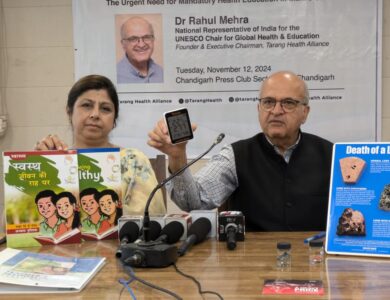Black Fever is on Rise in West Bengal

In Kolkata, a recent uptick in cases of visceral leishmaniasis, commonly known as black fever, has raised concerns, although officials emphasize that the situation is not yet alarming. Since October of this year, a total of 14 cases have been reported, with one recent fatality identified as Avdesh Paswan.
Health Department sources reference data from the National Centre for Vector Borne Diseases, reporting 375 cases of visceral leishmaniasis nationwide in 2023, resulting in five deaths. While acknowledging the seriousness of the situation, a senior West Bengal Health Department official states that the current figures do not indicate an alarming state. However, precautionary measures have been implemented, and the healthcare system remains on high alert for potential emergencies.
The official highlights West Bengal’s historical vulnerability to visceral leishmaniasis, along with Bihar, Jharkhand, and Uttar Pradesh. An alert regarding the possible impact of black fever was issued in October, particularly targeting districts such as Malda, North Dinajpur, South Dinajpur, Kalimpong, and Darjeeling.
Visceral leishmaniasis, commonly known as black fever or kala-azar, is a parasitic disease caused by the Leishmania donovani and Leishmania infantum parasites. It is transmitted to humans through the bite of infected female sandflies. The disease primarily affects internal organs such as the spleen, liver, and bone marrow, leading to symptoms like prolonged fever, weight loss, enlarged spleen and liver, and anemia.
Black fever is endemic in certain regions, including parts of Africa, Asia, and South America. The name “black fever” is derived from the darkening of the skin that can occur in some cases. If left untreated, visceral leishmaniasis can be fatal.
Preventive measures include controlling the sandfly population, using bed nets, and treating infected individuals with antimonial drugs. Early diagnosis and prompt treatment are crucial for a positive outcome. While the incidence of black fever has decreased in some areas due to public health efforts, it remains a concern in endemic regions.
The symptoms of visceral leishmaniasis (black fever or kala-azar) can vary, and the disease may present in different ways. Common symptoms include:
- Prolonged Fever: Persistent and prolonged bouts of fever are a hallmark of visceral leishmaniasis.
- Weight Loss: Individuals with black fever often experience significant weight loss.
- Enlarged Spleen and Liver: The parasites target internal organs, leading to the enlargement of the spleen and liver. This can cause abdominal discomfort.
- Anemia: Visceral leishmaniasis may result in a reduction in red blood cells, leading to anemia.
- Darkening of the Skin: In some cases, the skin may darken, giving the disease its colloquial name “black fever.”
- Weakness and Fatigue: Infected individuals may feel persistent weakness and fatigue.
It’s important to note that these symptoms can be nonspecific and may resemble other illnesses. Diagnosis typically involves laboratory tests, such as the detection of the parasite in tissue samples or blood.
Without prompt and adequate treatment, visceral leishmaniasis can progress and become severe, potentially leading to complications and, in some cases, proving fatal. Early diagnosis and appropriate medical intervention are crucial for a positive prognosis.
Netanyahu Asserts Israel’s Sovereignty Amidst US Interference Claims








